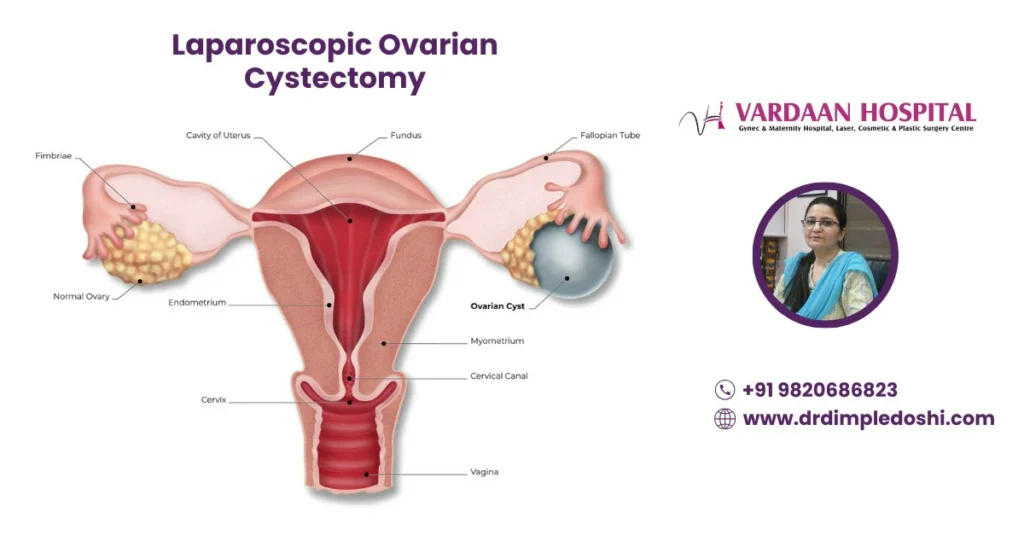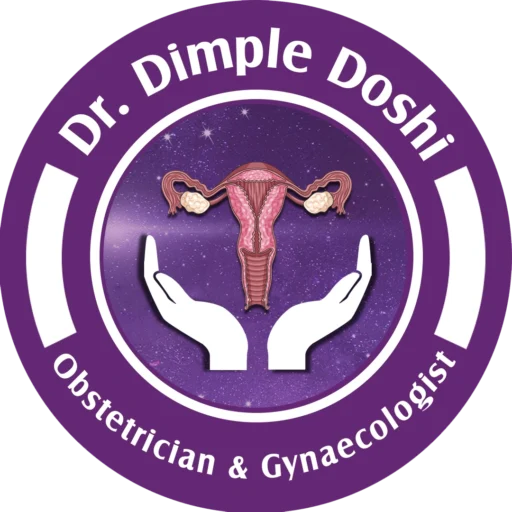Laparoscopic Ovarian Cystectomy: Procedure, Benefits, Recovery & Cost in Mumbai

Table of Contents
What is laparoscopic Ovarian Cystectomy?
Laparoscopic ovarian cystectomy is a minimally invasive surgical procedure to remove ovarian cysts. The procedure safely removes the cysts without affecting the ovary.
Laparoscopic surgery for ovarian cyst became popular for its faster recovery and minimal scarring. It’s a preferred solution for women experiencing pain or discomfort from cysts. The procedure aims to regain your comfort and well-being at the earliest.
Synonyms of Laparoscopic Ovarian Cystectomy:
Keyhole Surgery for Ovarian Cysts, Laparoscopic Cyst Removal, Ovarian Cyst Laparoscopy, Minimally Invasive Ovarian Surgery
What Are the Common Myths and Facts About Laparoscopic Ovarian Cystectomy?
Myth: Ovarian cysts always require surgery.
Fact: Most ovarian cysts are benign and may resolve on their own. Surgery is only advised when cysts are large, persistently grow in size, or cause symptoms.
How Is the Laparoscopic Ovarian Cystectomy Procedure Performed?
Step 1: The procedure of ovarian cyst removal through laparoscopy begins with giving you a general anesthesia to keep you comfortable throughout the surgery.
Step 2: After that a few small incisions near your belly button are made, through which a laparoscope (a small camera) and surgical instruments are inserted.
Step 3: Your surgeon safely removes the cyst without touching the ovary.
What Are the Indications for Laparoscopic Ovarian Cystectomy?
Laparoscopic ovarian cystectomy is recommended if you experience:
- Persistent, large, or painful cysts
- Cysts that has potential to turn malignant in future
- Cysts that has solid components like dermoid cyst
- Cysts are giving pain and causing discomfort
- Cysts that may pose a risk of twisting (ovarian torsion)
- Suspected endometriosis (cysts related to endometriosis)
What Are the Potential Risks of Laparoscopic Ovarian Cystectomy?
Laparoscopic ovarian cystectomy risks may include:
- Infection or bleeding
- Adhesion formation
- Injury to surrounding organs
- Rare instances of anesthesia complications
What Complications Can Occur After Laparoscopic Ovarian Cystectomy?
Complications are usually rare, in severe cases they may include:
- Problems of anesthesia
- Injury to internal organs
- Bleeding and infection
- Recurrence of cysts
- Pain or discomfort around the incision site
- Adhesion formation in the abdomen
How Should You Prepare for Laparoscopic Ovarian Cystectomy?
- Share your investigation reports with your surgeon. The reports include your complete blood count; liver, thyroid; kidney function tests and other preoperative tests, and the tumor markers to confront the nature of the cyst.
- Follow a light diet a day before your surgery. Avoid milk and milk products as they may bloat your stomach.
- Stop taking medications like estrogen-containing medicines a month before your surgery. Also, avoid blood thinners like aspirin at least from a week before surgery. At the same time you are instructed to continue your thyroid; blood pressure and diabetes medications.
- Your doctor will assess you to see if any signs of illness present before surgery to ensure health and safety.
- A night before surgery you will be given bowel cleansing solutions to avoid bloating on the day of surgery to make recovery smooth and easier.
What Results Can You Expect After the Surgery?
- Successful laparoscopic cystectomy results in relief from symptoms, and preservation of your ovarian function.
- You will experience improved quality of life and return to normal activities very soon compared to traditional open surgery.
What Does Recovery Look Like After Laparoscopic Ovarian Cystectomy?
Most patients can go home on the same day of surgery. Some patients may require a short hospital stay after surgery. Recovery time varies, but typically includes:
- Rest for the first few days
- You can start doing lighter activities in 3 to 4 days after surgery
- Full recovery can be experienced within 2 to 3 weeks
What Should You Know About the Post-Operative Period?
- You will be in the recovery room for 2 hrs after you wake up from anesthesia. You may feel sleepy for the next few hours after which you will be shifted to your room.
- You may have mild pain in your shoulder or back which is because of the gas used in surgery but it will heal within a day or two.
- You may have some discomfort in the treatment area or you may feel tired for a few days after the procedure but with each passing day you feel better.
- Contact your doctor immediately if pain doesn’t reduce each day or if it is associated with nausea and vomiting or any other problems.
- Keep the incisions clean and dry.
- Manage pain with prescribed medications as advised by your doctor.
- Attend follow-up appointments to check healing.
Who Is the Best Gynecologist for Laparoscopic Ovarian Cystectomy in Mumbai?
Dr. Dimple Doshi is the best lady laparoscopic surgeon in Mumbai, India for Laparoscopic Ovarian Cystectomy. Dr. Dimple has an extensive experience in treating numerous gynecological conditions and has compassionately provided highest-quality care and treatment accessible to women of all walks of life.
How Much Does Laparoscopic Ovarian Cystectomy Cost in Mumbai?
Laparoscopic Ovarian Cystectomy surgery cost at Vardaan Hospital, Mumbai have a range of packages depending on the facilities and stay you choose.
Different costs include:
- Economy ward/ general room: ₹ 50,000
- Semi special room: ₹ 68000 to ₹ 75000
- Deluxe Room: ₹ 1.2 lacs
- Super deluxe room: ₹ 1.5 lacs
- Suit rooms: ₹ 2 lacs
What Are the Most Frequently Asked Questions About Laparoscopic Ovarian Cystectomy?
Q1. What is the recovery time for a laparoscopic ovarian cystectomy?
Ans. Recovery takes between 1 to 2 weeks.
Q2. How painful will my first period be after laparoscopy?
Ans. You may experience some cramping or mild discomfort, but pain varies per individual.
Q3. How long healing takes after ovarian cystectomy?
Ans. Full healing usually occurs within 2 to 4 weeks after surgery.
Q4. Can ovarian cyst come back after cystectomy?
Ans. Yes, cysts can recur, especially if hormonal imbalances exist. In such cases, regular medical assistance is recommended for good health and safety.
Q5. Does laparoscopic ovarian cystectomy affect my ovaries?
Ans. No. The procedure aims to preserve your ovarian tissue and
remove cysts safely.
Q6. What is the success rate of ovarian cystectomy?
Ans. The success rate of ovarian cystectomy at Vardaan Hospital, Mumbai is high with 95% with most patients experiencing increased symptom relief after cyst removal.
Q7. Can a 15 cm ovarian cyst be removed laparoscopically?
Ans. Yes, large cysts up to 15 cm can be removed if they are sensitive in 2 hours of surgery.
Q8. When can I start walking after laparoscopic ovarian cystectomy?
Ans. Light walking is encouraged after 4 to 6 hours post surgery.
Q9. Which surgery is best for ovarian cyst?
Ans. Laparoscopic ovarian cystectomy is the preferred option due to its minimally invasive approach and faster recovery.
Q10. What are the positive effects of laparoscopic ovarian cystectomy?
Ans. Benefits include pain relief, preservation of ovarian function, faster recovery, and improved quality of life.
What Is the Medical Code for Laparoscopic Ovarian Cystectomy?
ICD code for Laparoscopic Cystectomy
N83.201– Unspecified ovarian cyst, right side
N83.202– Unspecified ovarian cyst, left side
N83.209– Unspecified ovarian cyst, unspecified side
CPT Code for Laparoscopic Cystectomy
49322: This code is for laparoscopic procedures on the abdomen, peritoneum, and omentum, including the aspiration of cysts or cavities
58662: Used to report a laparoscopic surgical procedure that involves the fulguration or excision of lesions in the ovary, pelvic viscera, or peritoneal surface
Reference taken from Codify by AAPC.

